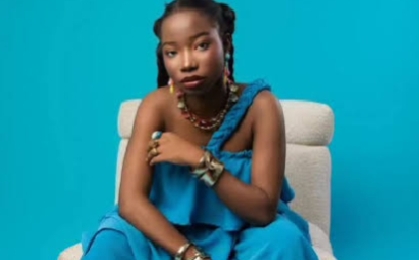Mama Efe, played by Rita Edochie, is the god whisperer whose authority is increasingly called into question following a string of failures that shake the belief of her followers and embolden her detractors. The tired matriarch has to fight internal and external battles to keep her esteemed place of privilege and perpetuate a system drowning under the weight of its promise.
In the prosecution of this ideological game of wits — and untamed violence — Mami Wata‘s agenda is openly political but also timely in the context of the state of African politics over the past three years.
For all of the devotion and reverence Mama Efe gets as the de facto leader of Iyi, the people are getting the short end of the stick. Even though they happily pay her periodic tributes, baskets filled with everything they work hard for, all they get in return is sick children who die because the village has no hospitals like its more-advanced neighbours. The town is also lacking most of the other development indicators a thriving society needs.
The conflict feels familiar because it’s not any different from the wave of discontent sweeping many African countries against their democratic leaderships. The system requires that the people believe in and uphold the sanctity of a social contract and be rewarded for playing by the rules. If the people their taxes and perform their civic duties, their leaders will provide schools, hospitals, good roads, clean water and maybe even an amusement park or two.
It’s the same type of disaster that eventually strikes Iyi when Jasper (Emeka Amakeze), a rebel fighter with no clearly articulated motivations, gives Jabi’s group the push to finally act and violently overthrow Mama Efe’s reign.
The aftermath of such an action is the same whether in any of the African countries affected by military coups, or fictional Iyi. The new overlords make a raft of promises to succeed where the old overlords failed — provide schools, hospitals, good roads, clean water, and maybe even turn water into wine.
But art imitates life, and the result of the rebellion isn’t much different from what has become the common outcome of numerous coups that have happened in Africa. In the place of those promises of development, there’s only more inept leadership and looting, only now playing in a different system that probably puts the people in more jeopardy. The violent taketh by force, but then, what next?
Mami Wata‘s ideological conflict about the utility of a mythical deity is projected through the same rumblings dominating political discourse across Africa. The intellectual disagreement on whether the continent needs democracy to function properly or just a decent roster of well-intentioned benevolent dictators is crystallised in how Mami Wata’s characters struggle between modernity and blindly sticking to culture and traditions. But the film isn’t explicitly preachy about which is best, and doesn’t commit to leaning heavily anywhere — it merely points to places where you see mirrors.
Mami Wata ends with a promise that another well-intentioned leader at the helm may be the beginning of new things for the people of Iyi, but just like the fate of Africans in the real world, there’s no guarantee of anything.





